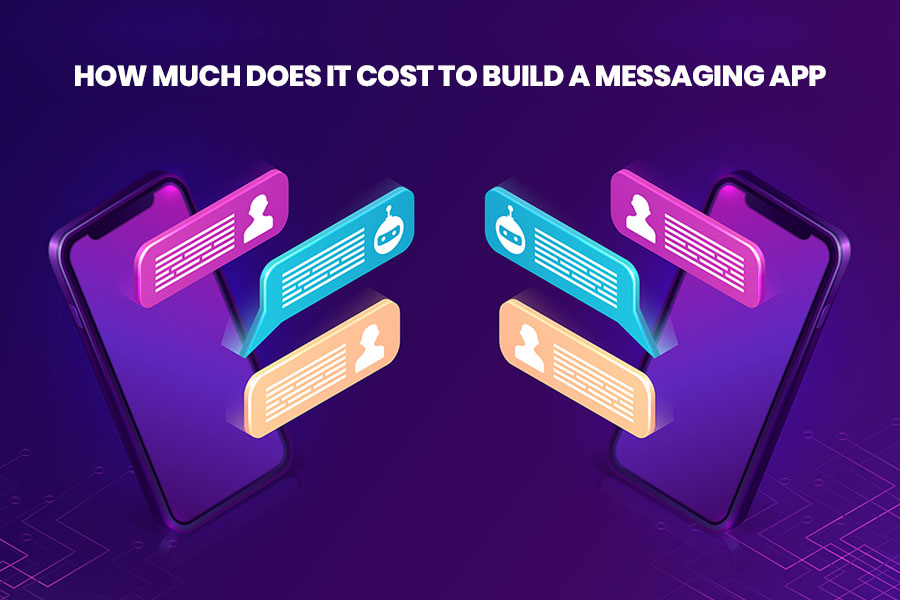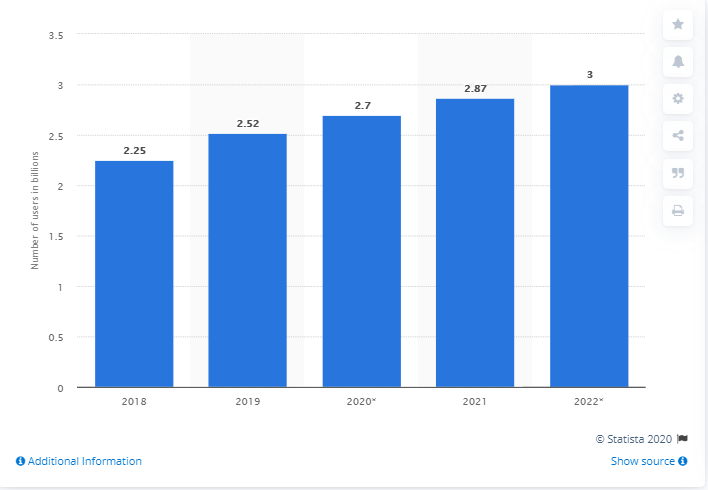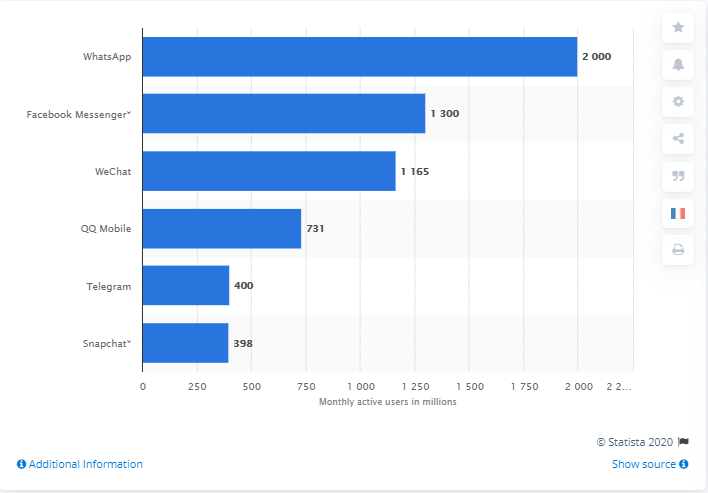Jun 14, 2021 Software Development
How To Make A Successful Messaging App In 2021?

Are You A Little Emojional?
The messaging world was a far cry from the time message reactions were announced, but expressing the way one feels has never been more critical. Imagine you are standing next to a friend who cracked a joke, you can laugh. You don’t need to pause and say “I found it very funny” or quote your own words back to them before showing a real-world emoji on your face.
Same but different is for the effectiveness of the firm.
The potency of a firm business process relies on employee engagement and workplace communication, especially in the Work From Home mode. For some specific niches, interactions with clientele are imperatives to your business unscaled success. Now or at some later stage, companies understand the need for an efficient tool for leveraging communication within the organization.
The universal quick fix is creating real-time chat features to let users get hands on the piece of information instantly. Besides, partnering with an experienced app development company, you can also integrate the functionality into an already published app or develop a standalone app for workplace communication like Slack.
If you are at the verge of creating an instant messaging app and skyrocket your business processes, we at Xicom have a plethora of valuable insights waiting for you. But, before delving into unfurling the deepest secrets of how to make a successful messaging app, it’s crucial to ask the right questions to be confident that the solution provided for your business is right.
- Is it a good idea to create a messaging app?
- How does the messaging app work?
- How to create a messaging app?
Let’s roll up the sleeves and get down to the business of developing another stupendous messaging app.
The Right Market Trajectory To Create A Messaging App – “A Good Idea”
Before you funnel down the list of creating a successful messaging app, you should first understand the deep insights of the people using them, why, how much time to spend there, and find the real competitors.
All this data will lend a hand in making an informed decision in the coming years.
Also Read: Creating a Customer App for Your On-Demand Platform – The Right Feature & Cost Analysis
According to Facebook, the art of communication are messages that matters. Presently, messaging is a part of everybody life for 80 per cent of millenials aged between 16-24 years and 91 per cent of GenZ aged between 13-18 years. The core reasons for people opting messaging apps, reveals the below listed points what allure them:
- Convenience
- Offer record of the complete chat
- No hold times
- Easy to use in working hours
- Easy at multitasking
As for this time, people spend a big amount of their day on messaging apps on average.
According to Statista, the number of mobile phones messaging app users worldwide from 2018 to 2022. The figure is projected to grow to three billion users in 2022.

In July 2019, Watsapp was the leading mobile messenger app globally. The messaging service had accumulated over 1.6 billion monthly active users and WhatsApp with two billion active users on a monthly basis.

Undeniably, all the above stats show the exponential drift in the market for messaging app. Thus it is a good idea to hire app developer and create your own app in minimal time with maximum proficiency.
Regardless of the existing messaging apps equipped with enormous useful features and extensions, they can cost you a whopping balance too. For example, Slack cost $8 a month per active user. Besides, the charges, the security protocols are another irreplaceable concern for the people, especially for the one dwelling from the finance sector. This raises the need to build a custom message app or integrate chat functionality into the current apps.
In the scenarios of developing a standalone messaging app and numerous other projects with built-in chat functionality, our experts have discovered the real magic behind a messaging app. This comprehensive guides walk you through the aisle covering three vital aspects:
- The Imperative Functionality – Discover the crucial features set for any messaging app.
- What is under the hood? Having a deep understanding of the technical aspects of the messaging app development.
- The Final Revision – The features to make your app one of itself.
Let’s start with “The Imperative Functionality”
These are many prominent features that hold the potential to turn your app into a silver bullet.
1. Messaging Instantly
Although the content and context of messages may vary, all text messaging app gratifies small tits and bits of information from one user to another. Therefore, this is the core feature of any messaging app and attention should be paid to every detail.
2. The Coded Chat
With the security breaches rising to alarming digits, integrating chats that go wane after a certain period of time is the need of the hour. So, it makes more than essential to partner with a mobile app development company that offers an unparalleled level of privacy.
3. The Delivery Ticks Confirmation
This feature shows whether the participant has received and seen a message.
4. Unsend Messages Notification
The latest update message app allow users to send messages within a set timeframe after the message shows unsend.
5. Group Chats Option
Include group chat functionality, especially when creating a messaging app for groups and communities. It can be used from professional front to medical backgrounds to discuss an essential concern with a specific number of people at an instant.
6. The Required Moderation
Integrating group chat functionality also requires adding moderation functionality. It allows admin to remove or add users, delete some specific messages, and make other users admin too. For instance, Telegram also has the same feature that allows admins to confine the number of messages from one user for a specific timeline.
7. Video and Voice Messages
In some scenarios, user’s don’t have time to types long messages. They prefer to go live and have a word rather than typing and typing. So, for added convenience, allow your users to send video and audio messages. The more channels of communication and interactiveness you offer to your user, the more convenient your app will be for your target audience.
Ok, let users communicate through free audio and video calls. Don’t forget to imbibe this excellent feature in group call functionality, and I know it takes a great effort to implement. Still, with the right app development in India and across the globe, it’s worth the efforts.
8. Integration With Social platform
The two significant reasons to include social platforms within your messaging app development are as follows:
- Easy Registration: While registering with social platform, a user can choose their message profile with a social network profile also. This cuts drastically on time-saving on typing the information.
- File-Sharing: This feature lets users share file and documents through social media accounts. In return, some messengers offer customized buttons on the specific website that let users share from the website directly in the messenger app.
Also Read: 12 Signs of a Successful Mobile Application
What’s Under The Hood? Features
Time for delving a little deeper into the technical nook of the app for developing a successful messaging app.
1. The Lines Of Codes
The lines of codes are the real ice breaker. What language should you pick for server-side implementation? As it’s rightly said, your back should be reliable, scalable and brace millions of connections per node.
So, being constant since the inception is crucial. Erlang and Golang have proved themselves as reliable and efficient solutions for messaging app development. So, here goes the comparison between the two options.
- Erlang – The most popular messenger app “WhatsApp” globally, is developed using Erlang. But you might be thinking why Erlang? Simple, because it was written in the early 1990s specifically for telecommunication equipment and supported design with its concurrency. It’s functional, dynamically typed, and performs garbage collection during a rundown. Leading app development company choose erlang as the lines of code for messaging back-end development. But, there is one concern – “Erlang is not a popular choice” and finding the right experienced talent is like finding a needle in the haystack.
- Golang – Have you thought of going for Golang for your app back-end? This programming language is simple, statically typed and comes with the lightning-fast speed that compiles into native code. Incepted by Google in 2009, this also supports concurrency by design and has a garbage collector. The concurrency models of Erlang and Golang were inspired by the CSP, or by communicating sequential processes. The programming language Golang has a vast community and an exclusive array of open-source projects. Therefore, finding developers who are experienced in the same landscape is not as hard as finding for Erlang professionals.
Now, what about client-side programming languages?
Following the latest trend in the mobile development world, Swift and Kotlin have come up as the top pick for iOS and Android versions, respectively.
2.Communication Parameters
Let’s rewind a little and start from the itineraries. To develop your messaging app, you will need to choose the communication protocol.
Is it a new term for you? Don’t worry, let’s have a quick rundown to under it better.
A communication parameter is a set of rules and guidelines that allow two or more devices to exchange data in real-time. Putting the finger on the right communication protocol is essential for a messaging app since it should provide a seamless and low-latency connection between all the participants.
Some of the definitive protocols I have listed are here; have a look.
Don’t forget that communication protocol is unskippable for a message app development since it should provide a seamless and low-latency connection between all of the chat participants.
- WebSockets
Many of you dwelling from a technical background might have heard about websockets. This is a modern and safe protocol allowing for continuous bi-directional data exchange between clients and servers.
The time a connection is established, the server and client exchange data without any request from the client-side. Data is sent to the client right after it arrives at the respective server. It’s because numerous users are connected through a single connection, websocket is known to consume less traffic and gratify messages faster than the other protocols you might have heard.
- MQTT (Message Queuing Telemetry Transport)
This can be a worthy choice protocol for exchanging data between clients and servers. This server published protocol was developed for clutching telemetry data. Presently, MQTT holds the abilities to connect different IoT devices. It jells well with TCP/IP and supports safe connections over TLS. But, one thing is for sure that could complicate your backend development that is – messages Brokers for MQTT.
With the default, MQTT message Brokers have a simple list of features like
- Authentication
- Authorization
- Publish and subscriber to queue.
But, to integrate features like group chat and messages statuses, you need to create plugins or build custom services that will receive messages, optimize and process them, and only after that publish them to another queue and deliver them to the user. I agree, it appears a bit complex and isn’t optimal from the architectural and performance perspectives, but still, it’s advantages are worth the consideration.
- XMPP (Extensible Messaging Presence Protocol)
This is baby boomer’s time communication protocol considered as one of the sophisticated XML protocols. XMPP is easy to extend or alter depending on your project’s needs. Designed for real-time messaging, XMPP has a very efficient push mechanism.
It’s safe and secure since it uses SASL; in addition, the development team from leading app development company work on end-to-end encryption to make the protocol even more safe. All thanks to the decentralized nature of this protocol, anyone can make their own XMPP server.
However, with pros comes cons as well. Developers complain about the verbosity and complications of the protocol, and long session introduction outcomes in slow connection speeds. Besides, it doesn’t offer message delivery confirmation also, which are nowadays essentials. So, developers need to handle this all manually. In my opinion, it’s an onus and talk of yesterday.
3. Restoring Chat History
There are undeniably two chat approaches to restore chat history.
- In the cloud (Same like Slack and Telegram)
- On user’s smartphone (Same like Viber)
Storing data in the clouds means that messages will be easily available when the user is switching from one device to another. Still, it’s in the need of additional expenses on your side. Storing everything on the user’s device is less convenient for the users themselves but for sure is not in the need of big investment in cloud storage. All you need to do is to step ahead and align with the experienced software development company that is well versed with back-up chat features in Google drive.
This will allow users with an easy hand to auto backup, but simultaneously this feature only stores text messages.
The Final Revision Aspect
After communication protocols and back-end finalized, it’s thumb up for the final check.
Final check means all the imperatives to abreast in the market to constantly improve app’s functionality. I have gathered some advanced features that make sure your app is a strong competitor to giants like Wechat and WhatsApp.
- One-Size-Fit-All Solutions With Chatbots
Chatbots are apps that integrate inside a messaging app. They significantly enlarge the functionality of your app, and it is a one-stop-solution, allowing users to do everything from searching user assistance to transferring funds to others.
But, make sure you curate thoroughly with third-party chatbot developers. Most of the reputed firms hire mobile app developers that are profound with writing guidelines for developing chatbots and simultaneously verify chatbots created by third-party.
- Digital Payments Gateways In Messaging App
Experts decoded WhatsApp’s highly-awaited feature “whatsapp payment”, allowing users to send and receive money from the messaging app itself. This latest in the payment world has made users take a sigh of relief from tabbing different apps.
There are also numerous ways to pay that can be worth thinking: Generating a QR SCAN CODE: This feature works in two choices, a user generated QR code and shows it to the merchant to make a payment. Whereas, in the second choice, the merchant develops different QR codes for different goods and pay according to the purchase made.
Web-based payments: This is like a free-hand to merchants as they are able to send product notifications to their customers and followers through official accounts. For instance, in Wechat, followers can quickly make a purchase order on a merchant’s shoppin page.
In The End…
Messaging app market personifies continuous evolution. Still, there is a void to be filled by a great message app that will yearn you the lion’s share. Don’t wait to be the future of communication; partner with a top mobile app development company with your free project discussion to beat real-time popular chatting apps.
Nevertheless, it appears daunting to compete with the exponentially rising number of messaging applications. But, to make your messaging app a head-turner in the market dominated by WhatsApp, partner with Xicom technologies to make your app a real magic bullet for users.
Might be the process sounds a little complicated if you lag in technical know-how our experts are here for your rescue.


